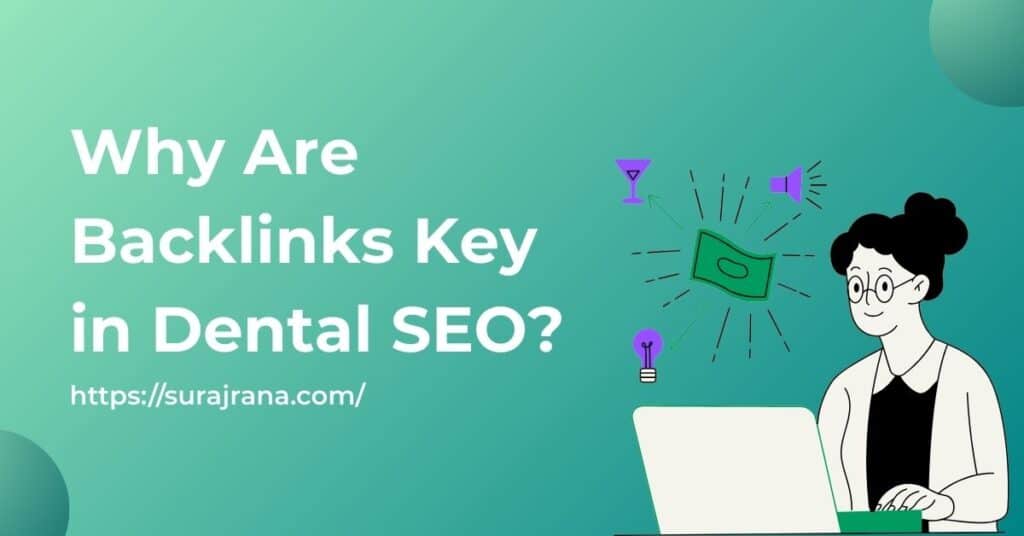Think of every backlink as a vote of trust. When another site links to your dental website, it signals, “This clinic is worth visiting.” Search engines read those signals and use them to decide which practices show up higher in results.
For Dental SEO, backlinks are one of the clearest signs that your content helps people. Strong links can lift your rankings, send you new visitors, and support steady growth over time.
This guide explains what backlinks are, why they matter for a dental clinic, and how to earn them in safe, consistent ways that help real patients discover your services.
What Are Backlinks?
A backlink is a link from one website to another. If a local newspaper covers your free oral-health day and links to your site, that is a backlink. If a parenting blog cites your brushing guide and links to it, that is a backlink too. Some links pass more value than others.
A contextual link in the main body of a helpful article tends to matter more than a link buried in a footer. A link from a respected health site is usually stronger than a link from a thin, off-topic blog.
You will also see “follow” and “no-follow.” Following links can pass ranking power. No-follow links may pass less power, but they still bring visitors and help your link profile look natural.
A healthy profile usually contains a realistic mix of both. An SEO Agency for Dentists can help manage these strategies effectively.
Why Backlinks Matter for Dental Practices
Trust and authority
Search engines use links as a trust signal. If respected sites point to your clinic, you look more credible.
When two dental websites have similar on-page content and good technical setups, the one with stronger, relevant links often wins.
For clinics competing on the same treatments, links can be the difference that lifts one above the other.
Rankings and visibility
Backlinks help your pages climb for the exact phrases patients type every day. When your whitening page or emergency page has quality links, it gains a better chance of appearing near the top. Higher positions bring more impressions.
More impressions bring more clicks from people who are ready to book. In crowded markets, this extra visibility compounds month after month.
Referral traffic that books
Good links do more than influence rankings. They send real people to your site. A link from a popular parenting hub, a community magazine, or a health authority can drive motivated visitors who already trust the source that mentioned you.
Those visitors often land on useful pages and convert by calling, messaging, or booking online. This is why a single strong link can produce value long after publication.
Local SEO benefits
Local links are especially powerful for clinics. Links from schools, sports organisations, charities, chambers of commerce, or community health sites show search engines that you are active in your area.
That relevance supports map visibility, brand searches, and trust with nearby families. It also builds relationships that can lead to repeat mentions, interviews, and ongoing attention.
Tip: Backlinks and citations are different. Citations list your name, address, and phone on directories.
Backlinks include a clickable link to your site. You need both for strong local results, but backlinks usually carry more ranking weight.
The Anatomy of an Effective Dental Backlink
Relevance, authority, placement, anchor text, target page
First, relevance: the linking site aligns with dentistry or with your community.
Second, authority: the site is trusted, such as a health publication, university, professional body, or recognised news outlet.
Third, placement: the link appears inside the main article where readers will notice it, not hidden in a boilerplate block.
Fourth, anchor text: the clickable words are natural and descriptive, like “gum disease treatment guide,” rather than a repeated, forced keyword.
Fifth, target page: the link points to a page that answers a clear need,service pages, location-agnostic pages, or strong blog guides ,so visitors find exactly what they expected.
A safe SEO Services for Dentists plan keeps these five elements in mind for every link you earn.
Safe Link Building for Dentists (White-Hat Only)
Link building should be ethical. You want links because you published something helpful, did meaningful community work, or shared expertise that others want to reference. \
Buying links on random blogs, trading links in bulk, or using private networks risks penalties and wastes budget. Over-optimised anchor text repeating the same exact phrase in every link also looks unnatural.
Aim for links that would still be valuable even if search engines did not exist because people would click, learn, and trust you more after reading.

What to avoid
Avoid schemes that promise dozens of links in days, sites that cover every topic under the sun with thin posts, and pages that exist only to sell placements.
Be cautious with directories that accept anyone without review. If a site is full of low-quality content or odd outbound links, skip it. Focus on relevance and helpfulness instead of shortcuts.
Practical Ways to Earn Quality Backlinks
Local partnerships & community
Community activities naturally create stories worth sharing. Host a free mouthguard clinic for student athletes, speak at a childcare centre about first dental visits, or support a wellness fair.
Ask organisers to recap the event on their websites and mention your practice’s involvement. On your own site, showcase your ongoing community participation so others can reference it.
Dentist-authored content
Editors welcome short, plain-language tips from dentists. Pitch articles to parenting hubs, wellness magazines, or professional association blogs.
Cover common concerns such as brushing routines for kids, enamel risks from sports drinks, or what to do after a dental injury. A short bio linking back to your practice helps build recognition.
Local PR and news
Journalists need timely, useful stories. Extend hours for emergencies, start an annual donation day, or release a seasonal oral-health checklist.
Share a clear media note with a strong quote. When the story helps people take action, reporters are more likely to reference your practice.
Testimonials & supplier links
Suppliers appreciate client success stories. Offer a testimonial with a photo for a lab, aligner brand, or dental software provider. Many suppliers feature these on their websites, including a link back to yours.
Patient education resources
Create easy-to-share resources like “A Parent’s Guide to Cavity Prevention,” “Emergency Dental Steps at Home,” or “Teeth Whitening Aftercare.”
Package them as clear articles or downloadable PDFs. Schools, clubs, and community groups often cite such guides when helping families.
Directories & associations
Complete robust profiles on respected professional associations and a handful of high-quality directories.
Add a short description, consistent contact details, and a link to the most useful page. These listings help discovery, and the links can support authority.
Data & digital PR
Run a small survey or pull anonymised practice data to answer a simple question, such as how often people use mouthguards in sports or which snacks cause the most staining. Share your results with context and a short explanation. When you publish clear, local data, schools, coaches, and health writers are more likely to reference and link to your findings.
Ethical outreach
Keep outreach human. Read the site, propose a fresh angle, and explain why your resource helps their readers. Be brief, polite, and specific.
If they say yes, deliver quickly. If they say no, thank them and keep the door open. Relationships lead to multiple references over time.
How Many Backlinks Do You Need?
There’s no set number, quality matters more than quantity. Study competitors ranking well, see what pages earn links, and aim to create stronger resources.
Often, just a few high-quality backlinks can move key pages when your site already has solid content and structure.
Build Links to the Right Pages
Homepages attract brand mentions, service pages work with topic-related links, blogs are best for outreach, and location pages gain links from community sites.
Internal Linking for Dental SEO
Backlinks bring visitors; internal links guide them. Link blogs to services, guides, or booking pages to improve flow and share ranking power.
Measuring Impact
Track rankings, organic and referral traffic, and log each new link with its details. Over time, this shows which strategies bring more calls and bookings.
A Simple 90-Day Backlink Plan
Weeks 1–2: Optimise on-page basics titles, headers, and content. Publish two linkable assets (e.g., a parent guide or dental emergency checklist) plus a “Community” page.
Weeks 3–6: Build authority. Support a local initiative, pitch two dentist-authored articles, and share a media update from your clinic.
Weeks 7–10: Promote your best content. Publish a detailed blog guide and share it with schools, coaches, or local health writers. Offer quick insights for seasonal oral-health topics and link to your resources.
Weeks 11–12: Review results. List new backlinks, check rankings, traffic, and patient bookings. Strengthen internal links from those pages to service and contact pages. Use what worked to plan the next dental SEO cycle.
Common Questions (quick answers)
Are no-follow links useless?
No. They can still bring visitors and make your profile look natural. A realistic mix of follow and no-follow links is normal and healthy.
Should I buy backlinks?
Buying links is risky and often wasteful. Invest in content, community, and media relationships that earn mentions because they help readers.
What if a site links to me in a bad way?
Ask politely for removal. If the link is clearly harmful and removal fails, collect examples over time and use a disavow file. Keep your main focus on earning better links.
How often should I build links?
Consistency beats bursts. Earning a few high-quality links each month compounds into stronger visibility across the year.
Conclusion
Backlinks matter because they reflect real-world trust. When helpful sites cite your clinic’s guides, news, and service pages, search engines see that trust and reward it with better visibility.
The most reliable gains come from useful work: community involvement, plain-language education, thoughtful data, and clear internal paths from learning to booking.
If you want a practical plan and expert guidance, Suraj Rana SEO can help you publish the right resources, build the right relationships, and measure the results that lead to appointments.

My name is Suraj Rana, and I am a seasoned Dental SEO Specialist with extensive experience in the Dental SEO industry. Leveraging my deep knowledge and expertise, I help dental practices enhance their online visibility and attract more patients.


